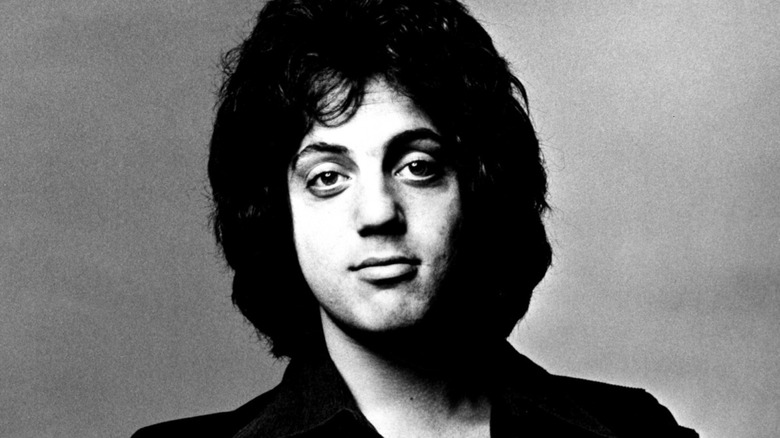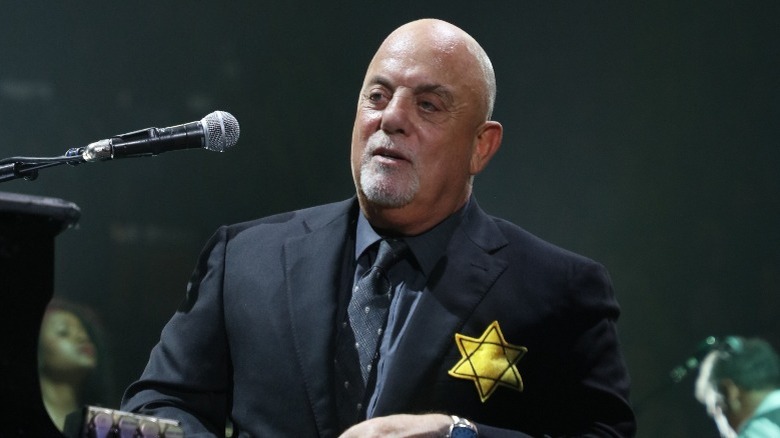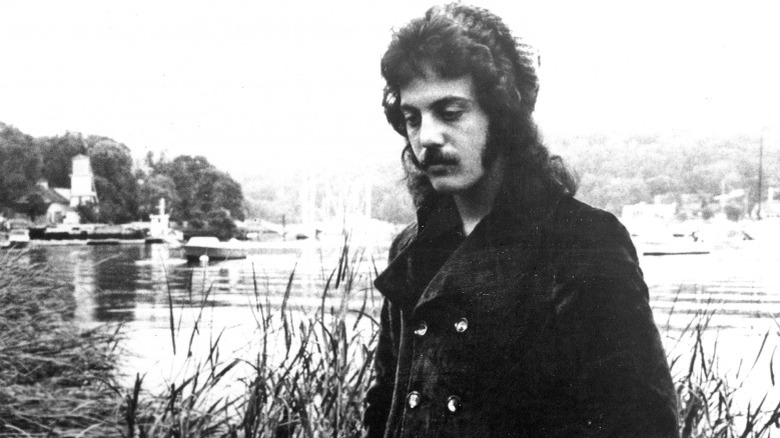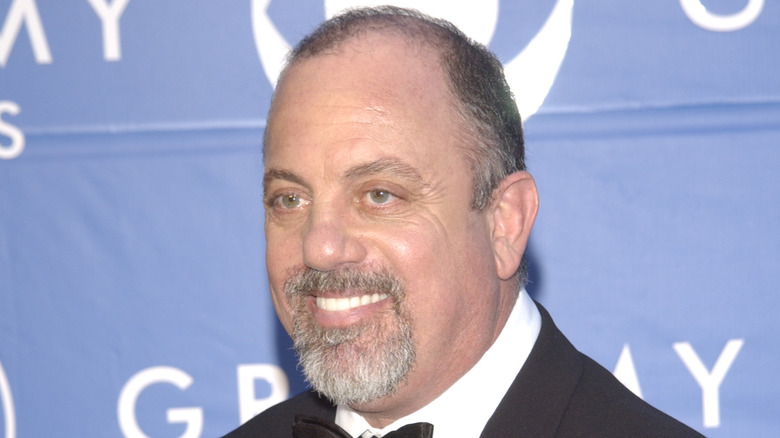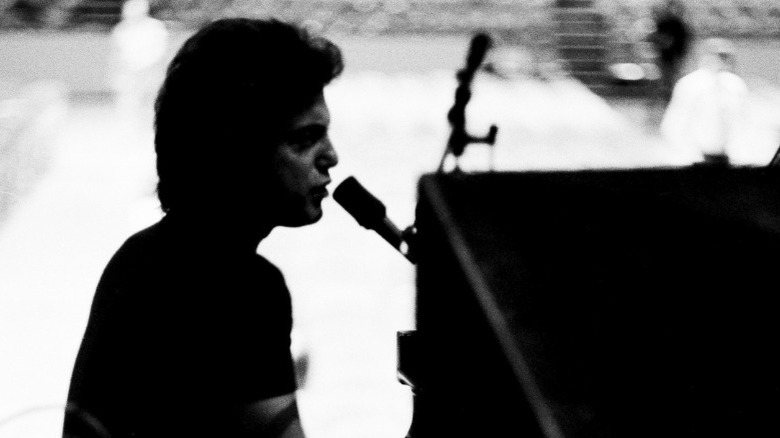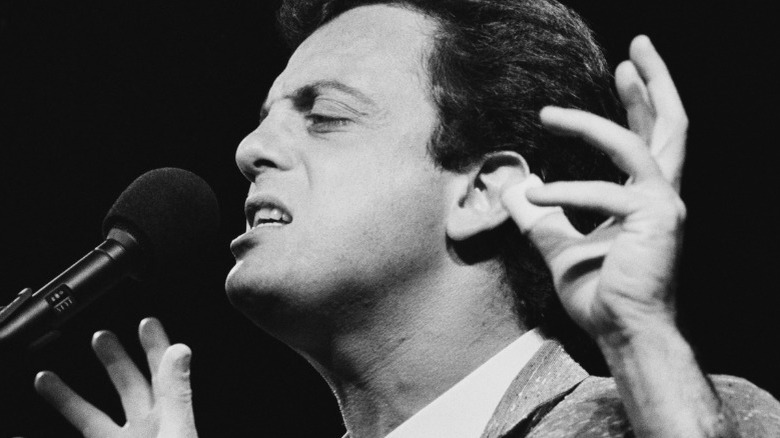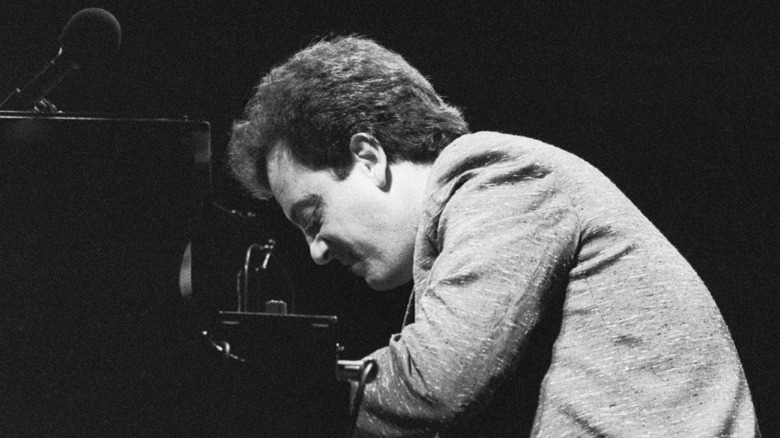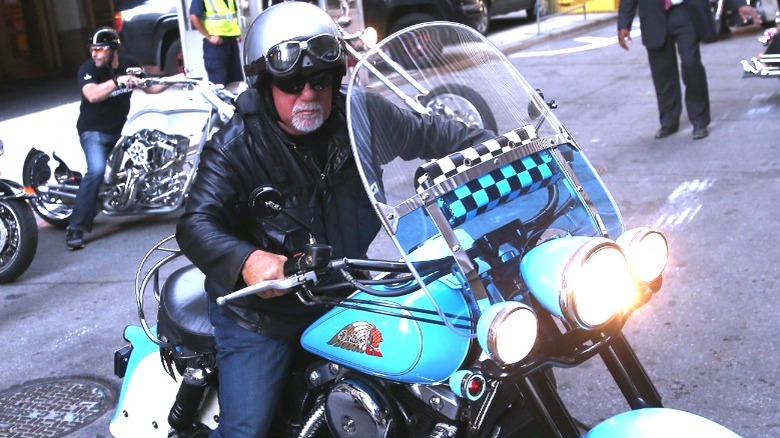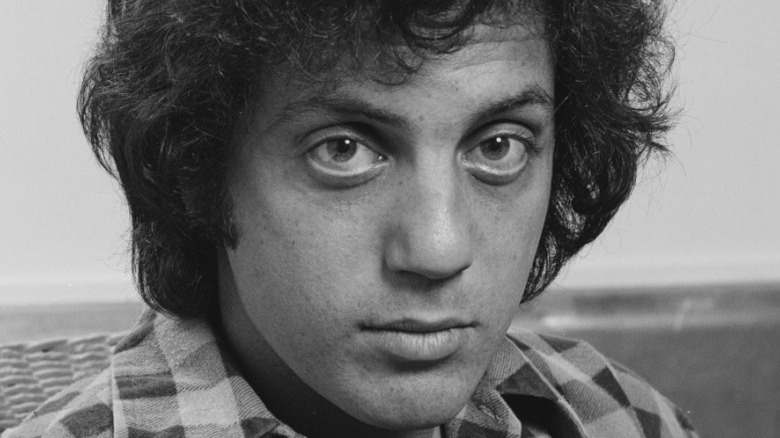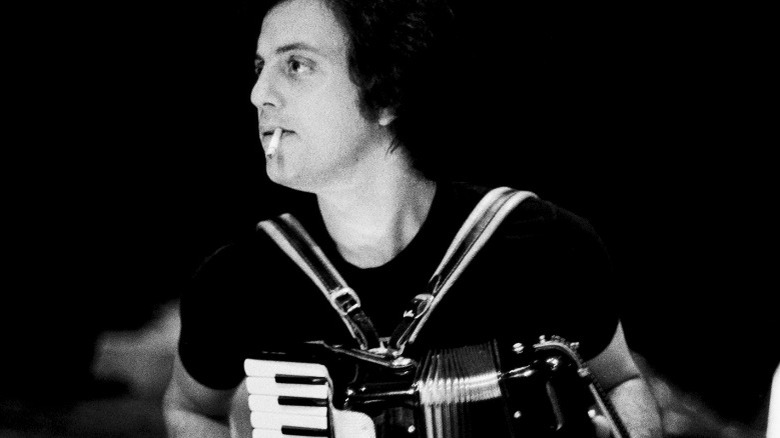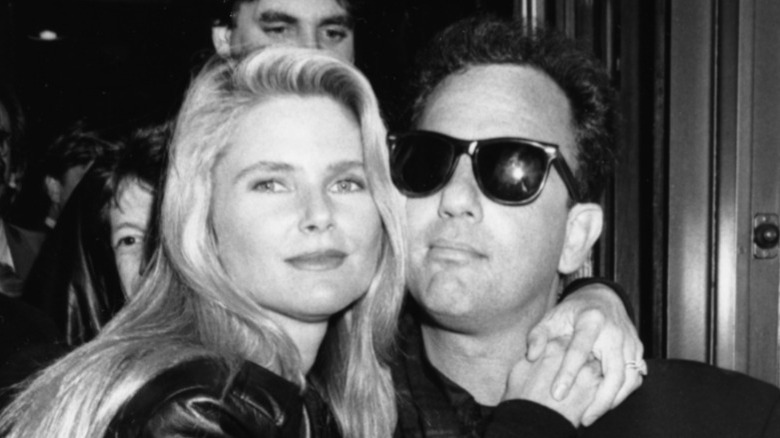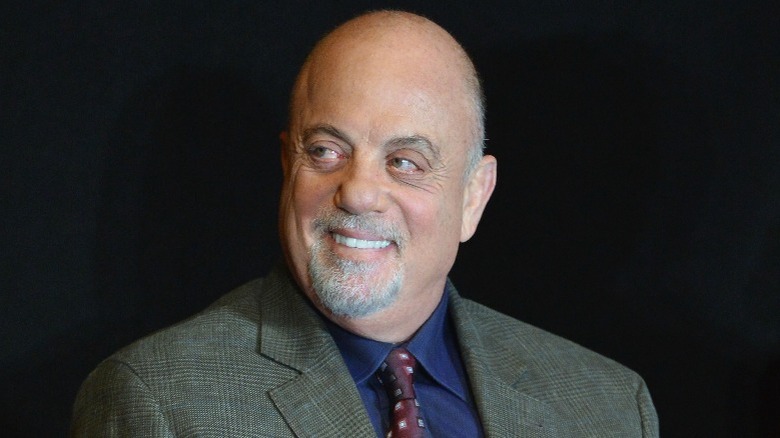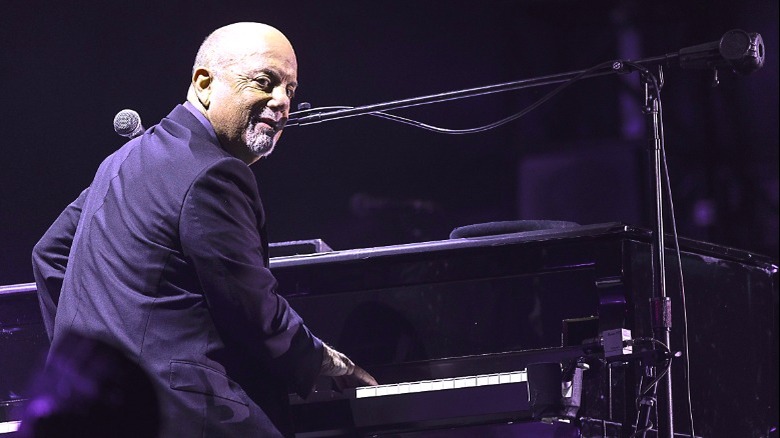Billy Joel: The Tragic Real-Life Story
Billy Joel is an enigma. He is hands-down one of the best songwriters of all time, yet he stopped releasing albums almost three decades ago. Still, with 33 top 40 hits, as per The New Yorker, everyone knows at least five Billy Joel songs –- even if they don't realize (or want to admit) they do. A true musical chameleon, he has been able to churn out wedding ballads like "Just the Way You Are," sweeping jazz epics like "New York State of Mind," rocked-out history lessons like "We Didn't Start the Fire," and new wave jams like "It's Still Rock and Roll to Me" with ease. And then, of course, there is the Steinbeckian lyrical genius of "Piano Man."
Yet, instead of applauding Joel's diverse catalog, many people resent him for it. While other artists of his time like Elton John and Bruce Springsteen are now revered as classic acts, Joel remains a polarizing figure — either absolutely adored or ruthlessly despised. A lot of it seems to come down to his sassy, off-putting Long Island persona and comically blunt interviews that don't always sit well with people. He comes across as smugly egotistical or refreshingly grounded, depending on who you ask.
So who exactly is the man behind those big, soulful eyes? While he himself certainly never said he was a victim of circumstance, Joel has endured some major hardships in his life.
Nazis Destroyed His Family's Wealth
According to Fred Schruers in Billy Joel's official biography, "Billy Joel," Billy's Jewish grandfather, Karl Joel, ran a multi-million dollar mail-order linen company out of Nuremberg in the 1920s. But as the world took an economic downturn, people looked to the Nazi Party for answers, and the Jews became scapegoats. Germans were encouraged to shun Jewish businesses and began thinking of Jews as lesser citizens. Jewish children, including Billy's young father Helmut, were forced to sit separately from other students at school. By the mid-1930s, the Nazis began actively persecuting Jews, and the successful Karl became a target.
First, Karl was wrongfully accused of underpaying and sexually harassing his workers. He countered this by relocating his factory to Berlin and agreeing to new Nazi terms, including hanging up a sign declaring that his business was Jewish-owned. But in 1938, a new law passed forbidding Jews to own businesses. He was forced to sell his hard-earned company to the Nazis for a fraction of the millions it was worth. To make matters worse, the Nazis' offer of payment turned out to be an attempt to lure him into arrest. The Joels first fled to Cuba in 1939, using what wealth they had left to expedite the process. They arrived in New York City in 1942.
Billy honored his Jewish heritage by wearing a Star of David at a 2017 Madison Square Garden show in protest of the Neo-Nazi march in Charlottesville, Virginia, per CNN.
His Father Left When He Was 7
According to Fred Schruers in "Billy Joel," Billy' Joel's father, Helmut Joel, was drafted into the United States Army in 1943, just a year after escaping Nazi Germany with his parents. Helmut, who adopted the more American name Howard, returned from the war a changed man. He married Rosalind Nyman and soon after, on May 9, 1949, they had a son – William Martin Joel.
Howard traveled frequently for work and was rarely around. "He was always a dark presence," Billy told Schruers, adding, "When I was about six years old, he said to me, 'Life is a cesspool.'" His parents divorced when Billy was young, and his father moved back to Europe where he eventually raised a new family. This impacted young Billy. "Without my own father around, I was constantly searching for my own identity," Billy said. "In some ways, this can free you up – you can be anything you want. But in other ways, you may not feel that you ever have a center." The silver lining? Although his father was a classical pianist, Billy believes that had he stayed, he would have discouraged him from becoming a professional musician.
Billy reconnected with Howard later in life. In an interview with Howard Stern (via Songfacts), he revealed that his song "Vienna" was his way of processing his feelings about his father. He later dedicated it to him at a 2012 show following his death.
He Took Up Boxing to Combat Bullies
Billy Joel's constant tinkering on the family piano caused his mother to insist on paying for piano lessons despite having little money, according to Fred Schruers in "Billy Joel." What started as a chore soon became his greatest passion. "I was just a little guy," Joel told Schruers, "and I wasn't a real social butterfly, but wherever I went, if there was a piano, I'd wander over and play it. And it enchanted people."
Unfortunately, music was not viewed as masculine in the early 1960s -– a time when boys were expected to play sports and act tough. To make matters worse, his piano teacher also taught ballet. "When I walked down the street with my piano books, I'd get these kids shouting, 'Billy, where's your tutu?'" Joel recalled. "They'd knock the books out of my hand and smack me around. So I took up boxing, and I got pretty good at it." He joined the amateur circuit as a teen. He won 22 of his 26 matches. When bullies came after him on the street, he would fight the biggest guy. They left him alone after that.
His boxing career ended when his opponent broke his nose during his 26th match, giving him his signature appearance. He commemorated the experience by featuring a pair of boxing gloves on the cover of his 1977 album "The Stranger." "I know what it feels like to get hit," Billy said in his biography, "but I also know what it takes to get back up."
Billy Joel Attempted Suicide Twice
Following an affair with the girlfriend of his best friend and bandmate, Jon Small, Billy Joel lost his friend, paramour, band, and house. He was forced to move back home at age 21, which was, according to Joel, a complete sign of failure, per Fred Schruers in "Billy Joel." One night in 1970, he called Small up to apologize. Small went over to see him and found Joel lying on the floor of his mother's house and rushed him to the hospital. "The next thing I remember, I woke up in the hospital and learned that they had pumped my stomach," Billy said, "I thought to myself, 'Oh, great, I couldn't even do this right.'"
He tried again a few weeks later, using a different method. "I was still having all these feelings of guilt and despair and hopelessness," Billy told Schruers. Following the second thankfully unsuccessful attempt, Joel checked himself into a psychiatric hospital for three weeks. Around this time he penned the lyrics to his song "Tomorrow is Today," which many friends believe doubled as a suicide note. "I was really depressed at the time I wrote that," Billy told Sirius XM of the song (via Songfacts), "Now, from this perspective, I can say, 'What did he know, he's 21.'"
In 1985 he released the song "You're Only Human (Second Wind)" with all proceeds going toward a teen suicide prevention program, per Bangor Daily News. "You probably don't want to hear advice from someone else," he sings in the song, "but I wouldn't be telling you if I hadn't been there myself."
If you or anyone you know is having suicidal thoughts, please call the National Suicide Prevention Lifeline at 1-800-273-TALK (8255).
His First Solo Album Flopped
Per Fred Schruers in "Billy Joel," Billy Joel recognized that to succeed as an artist he needed to release an album. He teamed up with Artie Ripp, the owner of Family Productions Records, who was willing to take a chance on him. Together, they recorded his first album as Billy Joel: the solo artist.
"Cold Spring Harbor" was released in 1971 -– but something had gone terribly wrong in the mixing process. At a listening party with his friends, Joel faced the horrible realization that everything was sped up — including his vocals. One friend even compared him to Alvin and the Chipmunks. "I was humiliated," Joel told Schruers. "I was so bent out of shape ... I wanted to crawl inside my piano and close the lid."
To make matters worse, Ripp had run out of money and was unable to correct his error. Angry, Joel attempted to sever ties with him, but, unfortunately, he was still locked into a contract with Family Productions. Reluctantly, he toured on the album in late 1971.
He moved to L.A. and Wrote the Ultimate Ode to Failed Dreams and Loneliness
In 1972, Billy Joel moved to Los Angeles to escape his record deal, per Fred Schruers in "Billy Joel." To pay the bills, he took a job as an entertainer at The Executive Room on Wilshire Boulevard, assuming the stage name Bill Martin. For six months, he worked at the piano bar, tickling the ivories almost every evening until 2 a.m. He made decent money and the drinks were free. "I took on this whole alternate identity, totally make-believe," he told an interviewer (via Schruers), adding, "but people didn't know I was kidding."
His brief stint there inspired his most famous — and autobiographical — song: an unassuming limerick-laced waltz called "Piano Man." The song's characters, as well as their various struggles, were all based on real people, per Songfacts.
It is a surprisingly uplifting song in which the characters, despite their failed dreams, listen to music "to forget about life for a while." As Billy sings, "they're sharing a drink they call loneliness, but it's better than drinking alone."
A Motorcycle Accident Almost Ended His Career
Billy Joel loves motorcycles. Per The New Yorker, he owns hundreds of vintage and custom bikes, which he keeps in a garage in Oyster Bay.
On April 15, 1982, Joel was riding his motorcycle down New York Avenue, per Fred Schruers in "Billy Joel." Jim Boyer, Joel's sound engineer, happened to be driving behind him and witnessed a car strike the front of his motorcycle. The wheel jerked sideways, pinning Joel's hand between the handlebar and the gas tank before he was flung from the bike, landing on the road many feet away. He was taken by ambulance to the local hospital and later transported via helicopter to Manhattan. "The next thing I knew, I was in Columbia Presbyterian in Manhattan with both hands in casts," Billy told Schruers.
His hands were in bad shape. In addition to a dislocated wrist, his left thumb was pulverized. Even after reconstructive surgery, he lost his distal phalanx -– the bone at the tip. While the accident did impact his playing, it did not end his career. "Because of the damage to my hand, there's no subtlety in my playing, no real nuance at all," Joel explained. "For rock and roll, I can hold my own, but in classical or jazz terms, I stink."
Two Epic Betrayals Cost Him Millions of Dollars
Tired of tedious business dealings, Billy Joel appointed his wife, Elizabeth Joel, as his manager in 1975, per Fred Schruers in "Billy Joel." For years, she helped build Billy's career into a great success. But it strained their marriage. In an attempt to save the relationship, he fired her and appointed her brother, Frank Weber — a trusted friend and father figure — as his manager.
Following his motorcycle accident in 1982, Elizabeth came to his hospital room with an attorney. It was the last straw for Billy. "I'm in a hospital bed and you're shedding crocodile tears and bringing me a contract that completely screws me? You don't do that to somebody," Billy told Schruers. He filed for divorce. Elizabeth was demanding during the divorce, angling for royalties and real estate and even suing her own brother at one point. "It was a pretty hefty divorce agreement," Billy said. To this day, she still makes royalties off his early albums.
And it wasn't over. Per the Los Angeles Times, following a 1989 audit, Billy made the horrific discovery that Weber had stolen millions of dollars from him over the years, committed fraud, made faulty investments in his name, and given out countless loans. Billy fired him and sued him for $90 million but only made $8 million back (per Fox Business). His lawyer, Leonard M. Marks, told People that the financial scandal was one of the worst he'd seen.
Alcohol Addiction Has Been a Lifelong Struggle for Billy Joel
Compared to other rock stars, Billy Joel is relatively straight-laced. Sure, he's tried drugs. But in the end, he always decides to self-medicate with plain old alcohol. "No matter what, alcohol was always there for me," Joel told Fred Schruers in "Billy Joel," "The truth is, I don't know much about sobriety. I know a hell of a lot about drinking."
Per the New York Times, Joel first checked himself into rehab in 2002 after drinking heavily for three months straight but only stayed for a few days. "To me, a musician going to rehab is like a normal person going to get his teeth cleaned," he joked after the experience. Elton John, his friend and touring partner, chimed in on his issues, citing Joel's alcoholism as a reason for canceled shows and claiming he needed more serious rehab, per The Guardian.
In 2005, after a series of car accidents, his then-wife, Katie Lee, expressed concern, and Billy checked himself into the Betty Ford Center. This time he stayed for a month and focused on getting better. "It was one of the best things I ever did," he told Parade.
If you or anyone you know is struggling with addiction issues, help is available. Visit the Substance Abuse and Mental Health Services Administration website or contact SAMHSA's National Helpline at 1-800-662-HELP (4357).
His Love Life Was Either Sadness or Euphoria
Billy Joel has loved and lost ... repeatedly. His first wife, Elizabeth Weber, inspired many of his early songs. Per Fred Schruers in "Billy Joel," Billy wrote "Summer, Highland Falls" about their tumultuous relationship, singing, "it was either sadness or euphoria." He also briefly dated model Elle Macpherson, though he always knew the relationship wouldn't last. He wrote the song "And So it Goes" about this doubt, filling it with dissonant notes and lyrics like "and you can have this heart to break."
By far his most famous relationship was with supermodel Christie Brinkley, who he met in 1983, per "Billy Joel." The two became friends and later married in 1985, conceiving their daughter, Alexa Ray Joel, on their wedding night. Billy called his album "An Innocent Man" "a tribute to Christie." She also starred in the video for "Uptown Girl" (inspired by her and Elle) and painted the cover art for "River of Dreams," per Billy's official website. According to InStyle, the marriage fizzled in 1994 due to a combination of heavy touring and Brinkley's desire to move west.
Billy then married aspiring culinary star Katie Lee, 33 years his junior, but they divorced in 2009. Shortly after, he met equestrian Alexis Roderick, and they married in 2015, per People. "You can have all the money in the world," Billy told Schruers, Without the girl, it doesn't mean a god***n thing." He remains friends with all of his ex-wives, even Weber.
He Stopped Releasing Songs
Billy Joel hasn't released a new album since 1993's "River of Dreams." Christie Brinkley often jokes that she was his muse, as he hasn't written a new song since their divorce, as per "Billy Joel," by Fred Schruers. But Joel has other reasons. For one, he became bored with pop music. "I wanted to write something other than the three-minute pop tune," he told The New York Times. "Very nice box to be in for a while, but then it becomes like a coffin."
His struggle with alcohol also factored in. "Drinking was one of the reasons I stopped writing songs, " he told Vulture. "I would drink to try and ease the pain of not being as good as I wanted to be." In the absence of liquid courage, he found he wasn't as willing to deal with the pain of coming up with lyrics. He told Howard Stern, "The worst thing about songwriting is the struggle. I love having written. I hate writing."
As it happens, "River of Dreams" also came out shortly before his divorce from Brinkley, prompting the drama-obsessed media to look to his lyrics for fodder. "I said, 'Wait a minute, I don't want to rip myself open and let everyone see everything,'" he told ABC News. "It was no longer comfortable."
The Critics Have Never Been Kind
Billy Joel is as hated as he is loved. Even at the peak of his career, he had critics. Robert Christgau (via The New Yorker) called him "a force of nature and bad taste." Liel Leibovitz (via Tablet) wrote of Joel's awfulness at length, referring to his music as both "singularly awful" and "solipsistic and soulless schlock." Ron Rosenbaum (via Slate), meanwhile, devoted an entire piece to bagging on Joel titled "The Worst Pop Singer Ever." Search the internet and you will find a plethora of scathing writeups on the Piano Man spanning his entire career.
A particularly popular critique is that he is "derivative." Joel clapped back at this one as Ray Charles inducted him into the Rock and Roll Hall of Fame in 1999 (via The New Yorker), saying, "Well, I'm damn guilty. I'm derivative as hell." He added that if that were grounds for elimination, many of the people in attendance wouldn't be there.
The criticism used to get to him, and he was once known to rip up bad reviews on stage, per "Billy Joel," by Fred Schruers. Nowadays, he doesn't care what you say anymore.
